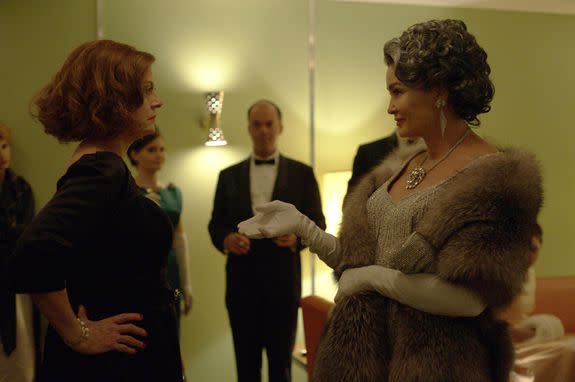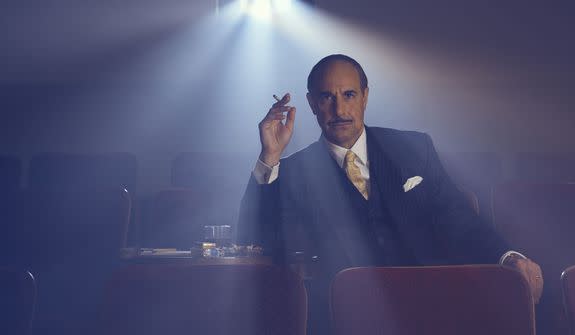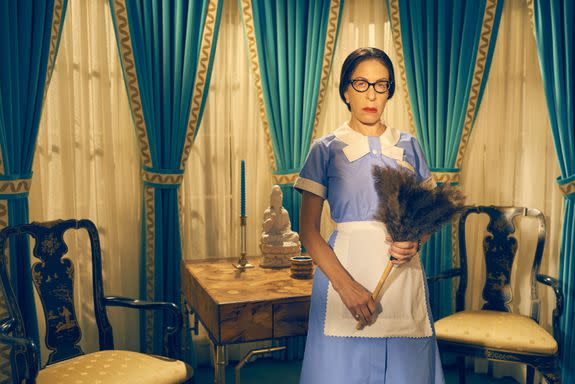'Feud: Bette and Joan' is about so much more than Hollywood's most infamous catfight

It was perhaps the most legendary metaphorical co-star catfight of Hollywood’s Golden Era. And it looks like Ryan Murphy is going to capture the conflict in all its spotlight-stealing, thunder-taking, glamorously bitchy glory.
FX’s latest Murphy-helmed limited series, Feud: Bette and Joan, which premieres March 5, chronicles the notoriously combative off-screen relationship/rivalry/personal hatred between two bona fide movie icons of their day, Joan Crawford and Bette Davis. The series takes place as they team on screen in an attempt to stage major comebacks and regain their fading celluloid glory in the ghoulish 1962 psychological horror film Whatever Happened to Baby Jane?
SEE ALSO: Prince Charles and Princess Diana will be Ryan Murphy's next 'Feud'
Hollywood history – and box office receipts – proved it was a successful move for both stars, but at a price: their mutual enmity, barely contained in their freewheeling youths, turned to out-and-out warfare before, during and after Baby Jane. It wasn’t quite as twisted, brutal and punishing as the battle waged by the sisters they played on screen, but it came damn near close in the psychological toll it took on the dueling divas and their intimates — wounds that persisted to the end of their days.
As we watched the first batch of episodes made available to critics, it became clear that Murphy – always a keen observer of interpersonal combat among the talented, the privileged and the ego-driven – and co-creator Tim Minear (who has previously collaborated with Murphy on American Horror Story) are going to make their telling a delicious banquet of Hollywood dish for the ages, but also a potent parable of the issues faced by women, both then and now.
Here are seven key things we learned:
Jessica Lange remains television’s most transformative actress
It’s safe to say that just a few minutes into her first appearance, audiences will embrace Lange’s startlingly effective transmogrification into an entirely different icon, in a deeper, more meaningful and decidedly less campy take on Crawford than Faye Dunaway’s memorable turn in the enduringly over-the-top 1981 biopic Mommie Dearest.
Though Lange’s performance its not without its winking quirks, it’s a more subtle and nuanced look at an actress who was known for taking charge in a world in which many of her powers – her seductive charms, her moneyed husband, her box office clout – have been diminished. Lange’s embodiment of Crawford borders on the uncanny.

Image: Suzanne Tenner/FX
Susan Sarandon promises many bumpy nights ahead
Although her shift into Davis – an actress who often portrayed almost a high-dudgeon caricature of her larger-than-life self – is not as eerily spot-on as Lange’s Crawford (and given Bette’s BIGNESS, how could it be?), Sarandon uncorks every bit of acerbic attitude in her arsenal – something we haven’t seen from her before to this magnitude –and it works like gangbusters, especially when juxtaposed against the quieter moments that expose, but never try to overly explain, where that venomous veneer was coming from.
Joan and Bette aren’t even the bitchiest characters In the show
At first glance, that dubious honor may go to Judy Davis’ arsenic-spiced portrayal of the undeniably nasty Hollywood gossip columnist Hedda Hopper (moviegoers may recall Dame Helen Mirren’s acid portrayal of the red-baiting dirt-disher in 2015’s Trumbo), who in her sing-song voice offers to quash personal exposés on the stars’ private peccadillos in exchange for direct quotes about even more of-the-moment figures, just to feed her readership’s appetites for the dirty laundry of the rich and famous.
A close second is Stanley Tucci’s penny-pinching, masseuse-groping, grudge-holding studio head Jack Warner, the ultimate expression of the old studio system’s ugly power and privilege, even in its dying throes.

Image: Kurt Iswarienko/FX.
No dishy detail is spared
Like its predecessor, The People V. O.J. Simpson, every colorful bit of backstory merits an artful nod — take note of the delicious internal politics of the studio system and its many simmering resentments — while every role is worth casting an A-level performer. The likes of Catherine Zeta-Jones and Kathy Bates (and, down the line, Sarah Paulson) play famed Hollywood screen queens looking back (and sometimes down) at their peers.
And there’s plenty of prescient setting-up of conflicts to come – Kiernan Shipka’s brief appearance as Davis’ later-estranged daughter B.D. promises some juicy exploration of both divas’ rocky relationships with their offspring.
Did we mention that NO detail is spared?
The place setting is perfect for this meal: Revel in the meticulous production design – including the Midcentury Modern glory that is Crawford’s Brentwood home, as decorated, plastic covered sofas and all, by her close friend Billy Haines (one of Hollywood’s first proudly out gay actors, who went on to become an in-demand interior designer).
Then there’s the deliriously grand choices of period music, like Nat King Cole’s “The Autumn Leaves” and Mel Torme’s “In the Evening (When the Sun Goes Down),” and the spot-on recreations of the actresses’ earlier films – not to mention the very '60s, very Saul Bass-ian opening title sequence, which effortlessly transports you to a time of opulent glitz and glamour.
And, of course, a reminder of Joan’s penchant for very visibly swilling and shilling Pepsi-Cola, thanks to her stake in the company via her late husband, Pepsi CEO Al Steele, is never more than a few scenes away.
“Mamacita” will quickly become your favorite side character

Image: Kurt Iswarienko/FX
Just trust me on this one. The always terrific Jackie Hoffman kills it here as Crawford’s devoted and more than a little quirky housekeeper/confidante. KILLS. IT. And as offbeat a character as she is, Mamacita will have a significant influence to exert as the story unfolds.
It’s not really about the catfights
Much like The People v. O.J. Simpson, Feud is more than just a sumptuous retelling of a juicy moment in history: there’s deeper meaning to be explored here.
While it doesn’t have the inherent and incendiary socio-political and racial relevance, nor the ubiquitous shared pop cultural memory of the Simpson trial, the show does plumb a number of timely themes that richly resonate beyond the series’ Hollywood setting, in terms of the enduring sexism and ageism plaguing many industries, and the media’s penchant for perpetuating female rivalries instead of focusing on women’s true foes.
Feud: Bette and Joan airs Sundays at 10 p.m. on FX.
